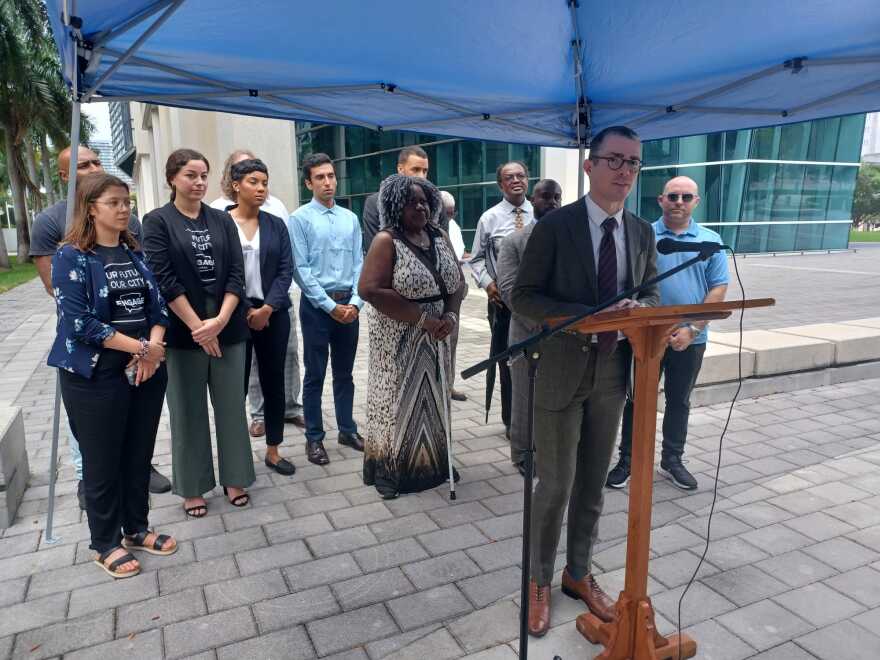The City of Miami and a collection of voting rights advocates have come to an agreement on what Miami’s voting map should look like, after more than a year of tense litigation on the back of a federal judge calling the current map "racially gerrymandered."
As part of the deal, the city would cover the advocates' legal bills of over $1.5 million. Added to the city's own litigation costs — detailed in new documents obtained by WLRN — it means taxpayers would pick up an almost $3 million tab for Miami's insistence on using a map that critics and a federal judge called "unconstitutional."
The agreement would also require the city to put to voters a proposed limitation on future redistricting as well as as well as the option to create a 'Citizens' Redistricting Committee' for Miami.
After a scathing order from Federal Judge K. Michael Moore, city commissioners worked with local advocacy groups represented by the ACLU of Florida and Dechert LLP to craft a new map that complies with the 14th Amendment to the U.S. Constitution.
A resolution to approve the settlement agreement is set for the city commission's May 9 meeting. The deal requires a majority vote from Miami's five commissioners.
READ MORE: Federal judge rules that Miami’s voting map is racially gerrymandered
In December of 2022, a coalition of groups including the South Dade and Miami-Dade branches of the NAACP, Engage Miami and Grove Rights and Community Equity, Inc. sued the City of Miami for racially gerrymandering its district maps. The plaintiffs alleged that commissioners drew district boundaries predominantly on the basis of voters' race —maintaining one Black district, one white district and three Hispanic districts. Judge Moore sided with the plaintiffs.
“Today’s agreement shows that when we stand together as a community, we can overcome anyone who tries to ignore our voices,” Carolyn Donaldson, executive board member of the South Dade branch of the NAACP, said in a written statement. “The map provided by today’s agreement will help our advocacy for communities in Coconut Grove and across Miami, and particularly its Black residents.”
New map aims to reconnect communities
The new map maintains the general shape of existing districts, with a few major changes — the most obvious of which is that Coconut Grove, Miami’s oldest neighborhood, is once again united. The Grove was previously contained entirely within District 2 until the 2022 redistricting process split the neighborhood into three districts, each with a different commissioner. The new map returns the entirety of Coconut Grove into District 2.
Overtown, one of Miami’s most significant historically-Black neighborhoods, is now entirely within District 5. Under the city’s map, parts of Overtown were split into Districts 1 and 5.
The Allapattah neighborhood has also been completely condensed into District 1.
The plaintiffs’ goal was to reconnect communities and set district boundaries based on natural borders like the Miami River and major roads.
The section of District 2 that contained the neighborhood of Edgewater to the northeast is now bounded by railway tracks to the west. U.S. Route 1 now serves as the border between Districts 2 and 3 in Miami’s Brickell area.

Records show legal costs
Records obtained by WLRN show that the City of Miami spent more than $1 million in taxpayer money defending the racially gerrymandered maps. The city retained the outside law firm Gray Robinson to litigate the case they ultimately lost. Attorney fees and costs totaled about $1.29 million from the city’s general fund, according to the City of Miami legal department.
The city also agreed to pay the plaintiffs' attorneys fees and costs in the amount of $1.58 million.
Notably, Miami City Commissioner Joe Carollo’s home in Coconut Grove is no longer part of his district. The property came under scrutiny when the city’s 2022 round of redistricting carved the section of Coconut Grove containing Carollo’s house into the district Carollo represents, District 3.
Carollo had previously moved out of the home when he ran for District 3 commissioner in 2017 because the Miami city charter requires elected officials to live in the district they represent. The city’s map consultant, Miguel De Grandy, admitted during court testimony that he manipulated the map to put Carollo’s house in District 3 to “make him happy.”
Carollo’s home is currently at the center of a legal dispute, as two men who won a federal civil judgment against the commissioner are seeking to auction the property to pay part of the $63.5 million in damages they are owed.
But Carollo's seat in the commission will not be in danger. The settlement agreement includes a provision that ensures current commissioners will not be affected by the change in boundaries.
"...Approval shall include a decree that no change in district boundaries caused by this Resolution that would affect the qualifications of any incumbent commissioner under Section 4(c) of the City Charter or Chapter 16 of the City Code will disqualify such incumbent commissioner during the term for which they are elected," the city's May 9 agenda states.
Commissioner Carollo is termed out and cannot seek reelection to his seat in 2025.
The new map will be implemented for the November 2025 municipal election.
The settlement agreement also requires the city to put a proposed charter amendment on next year’s ballot. The amendment would ban mapmaking that benefits incumbent commissioners and commission candidates. It would also create a “Citizens’ Redistricting Committee” to give map recommendations to the commission in future redistricting cycles.
You can search for your address in the redrawn districts below, in a map created by the ACLU of Florida.






